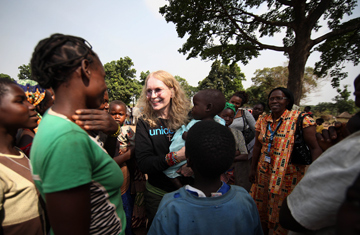
UNICEF Goodwill Ambassador Mia Farrow spoke to communities displaced by brutal attacks from the Lord's Resistance Army (LRA) during her visit to Southern Sudan ahead of Independence on July 9, 2011.
Recently returned from her third trip to the war-torn region of south Sudan, 66-year-old film legend Mia Farrow is consumed with shining a light on the struggles of the people to gain independence from the north. This past January, south Sudan voted to secede, following a 22-year conflict which killed two million people before a peace deal brought about a fragile calm in 2005. But still unresolved is the issue of the border region of Abyei, which is claimed by both the southern Ngok Dinka, who live there permanently, and the Misseriya, northern nomadic cattle-herders who move to the area during dry months. Brutal clashes have kept Abyei from holding a vote to decide its future, but Farrow is hoping to celebrate with the Ngok Dinka if and when the dust finally settles.
Since 2000, you've been a UNICEF Ambassador, traveling to trouble spots such as Sudan, the Democratic Republic of Congo, Chad and Haiti. How did you get involved?
I was invited to come onboard with UNICEF on the eradication of polio initiative. I assume it was because I had polio myself and I have a son from India who is a paraplegic as a result of polio. After a couple of trips with UNICEF, I began to get it.
What kinds of things have you been witness to over the years?
In a broad stroke, atrocities of the worst kind, being perpetrated by human beings against other human beings.
You've just returned from your third trip to Sudan's conflict-ravaged south. How would you describe the situation over there?
In January, as decreed in a ceasefire arrangement, the south voted for their independence either for or against continuing as part of the north. They, of course, to no one's surprise, voted for independence. That said, the Abyei region is a special region ... it's where most of the oil fields are.
There's a nomadic tribe in the north called the Misseriya that is responsible for the attacks on Abyei. By all accounts, they're armed and trained and funded by the government of [north] Sudan. Khartoum wants the Misseriya tribe to be allowed to vote in the Abyei region; the residents of Abyei [the Ngok Dinka] dispute that because the Misseriya spend 2-3 months a year there ... Abyei is a flashpoint which could bring the south back into full-scale warfare. But on both border lands, the people are just pleading for protection. People are in a state of terror.
Any stories of hope at all?
I find hope everywhere. The spirit of the people is extraordinary. If we can just make sure that one rung of the economic ladder is within their reach, knowing the people of south Sudan, they will grasp it and climb out of this. But Abyei is in true crisis right now. A woman said to me: 'We don't know when we go to sleep at night, if we will be alive in the morning. We keep our children close, we don't let them out of our sight.'
Your special focus is on children impacted by conflict. Does it constantly amaze you how resilient children can be?
You can't feel hopeless looking into the face of a child. I'm glad you mentioned hopeless and it goes with that terrible twin, helpless. I think that hopelessness and helplessness are the enemies of all progress and I think the saddest person in the world is the person who did nothing. We're not going to change the world but everybody's got to do their part.
I loved reading a story where after taking children to meet Mother Teresa, it had such an impact on you that you joined the back of the line so you could shake her hand again.
Yes! It was so exciting I couldn't believe it. It felt so good to meet her, it was just exhilarating. And here's the funny thing: I [once] met Michael Douglas twice too and I already knew him! I said hello and then 15 minutes later, he sees me moving towards him, with me saying "hello, nice to see you!"
You've been speaking to the press a lot about what you've seen, but what kinds of conversations have you had with politicians?
Countless and all the time. You've got to be part Rottweiler and keep at it. I was really excited when President Obama was elected for all sorts of reasons. On the Darfur issue, he said it was a stain on our conscience and he visited the camps in Eastern Chad, so I was hopeful he'd appoint an effective envoy but nothing really has been done.
You also use your blog as an insight to your thinking.
Absolutely. Now we don't need newspapers and I don't have to be Rupert Murdoch to write anything I want. I can send it out and it will be read by countless people, so I love the blogosphere.
Any future trips to Sudan on the horizon?
I'd love to go back to south Sudan to celebrate with them in July [for the Abyei referendum] and stand with the people of Abyei come what may, God willing. I can't wait to go back.
